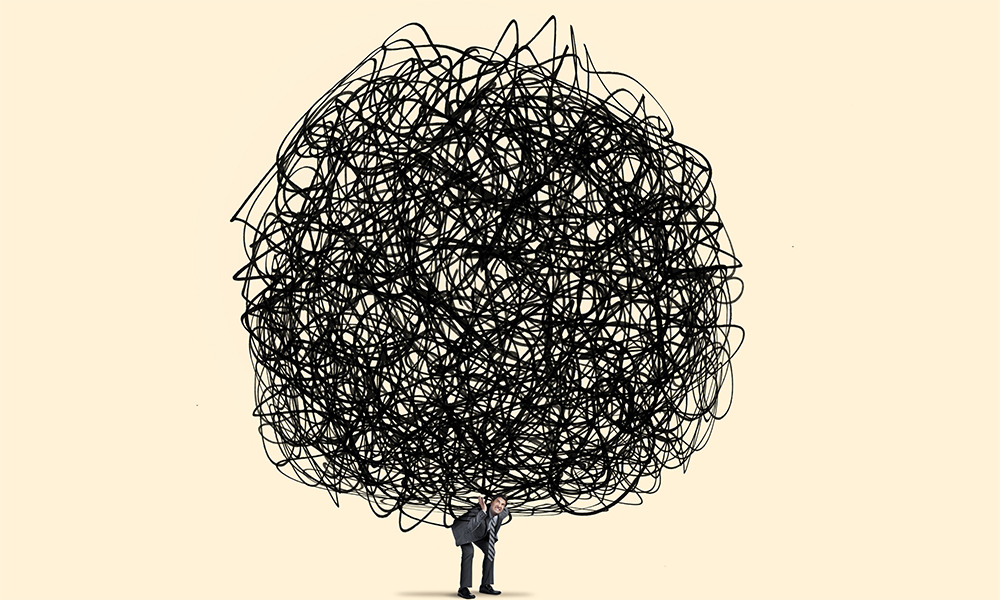I was recently speaking to a founder who was struggling with adapting his style as the company was rapidly scaling up. When the company was smaller, there were relatively fewer decisions to make. As it got larger, there were a lot more things– both big and small – to resolve. The founder was second guessing himself. He was driving the team crazy by dwelling on even the smallest decisions. The organisation was getting stuck.
Do you often get stuck in mental loops, worrying about the past or the future? Do you weigh every aspect of every issue, getting so tangled up in the details that making the “right” decision feels impossible? Do you spend so much time thinking about all the things could go wrong that you are unable to take decisive action?
If yes, you are an overthinker — and you are certainly not alone. Overthinking is everywhere in today’s world, and it seems to be on the rise with every subsequent generation. According to a study by the University of Michigan, over 73% of adults between the ages of 25 and 35 overthink chronically, as do 52% of adults aged 35 to 45. This is not surprising given that we live in an age of information overload, which in turn generates incessant and chaotic thoughts in our own minds.
Thoughtfulness, which is a strength, is not the same as overthinking. Taking a considered, critical approach is useful: it helps you process complicated issues and make good decisions, then move forward into implementation. But overthinking is unproductive: it wastes your time, energy and mental resources, trapping you in a state of inaction and anxiety.
In her article for the Harvard Business Review, executive coach Melody Wilding also points out the neurological dimension of overthinking. Dubbing overthinkers as “sensitive strivers”, she explains:
Studies show that sensitive people have more active brain circuitry and neurochemicals in areas related to mental processing. This means their minds not only take in more information, but also process that information in a more complex way. Sensitive strivers are often applauded for the way they explore angles and nuance. But at the same time, they are also susceptible to stress and overwhelm.
Along with taking a toll on your mental wellbeing, overthinking can be a serious disadvantage at the workplace, where it can paralyze decision-making. Each day in your job, you need to make hundreds of decisions. If you habitually overanalyze each and every one of these, you wind up delaying action and losing out on opportunities. Your productivity also suffers since you lose valuable working time to unnecessary rumination. Last but not least, constant overthinking increases the risk of burnout.
Strategies to stop overthinking
Here are 12 suggestions to help you curb overthinking:
1. Accept you are an overthinker.
Acknowledging that you have a tendency to overthink, like so many others, takes away some of the anxiety associated with it and makes it more manageable. Once you become self-aware, you will be able to recognise when you are overanalyzing or second-guessing yourself. This allows you to take a step back and start making changes.
2. Let go of perfection.
Perfectionism pushes a flawed all-or-nothing worldview. It makes you believe that you need to know every single detail and account for every possible outcome before making any decision. Instead of insisting on perfection, shift your focus to action and impact. Focus on the next good (not best) step you can take that will move the needle and bring your goal closer. Remember, perfect is the enemy of done!
3. Write down your thoughts.
Externalizing your thoughts can make them less overwhelming. The simple act of writing down complex thoughts and emotions helps to detangle them, allowing you to view them more objectively. Try journaling or simply jotting down your thoughts to de-clutter your mind.
4. Allocate time to worry.
Strangely enough, setting aside some dedicated time for overthinking is a good way to stop it from dominating your whole day. Put a timer for 10 minutes and give your inner worrier free reign. Ponder the worst-case scenario and mull over all the things that could go wrong. Once your 10 minutes are up though, that’s it. No more overthinking for today!
5. Assess your thoughts.
What differentiates constructive thinking from unproductive overthinking? It’s important to grasp the difference. Examine the thought in question. Is it useful? Is it improving your understanding? Is it helping you solve a problem? If yes, keep thinking. If not, it can be classified as overthinking, a signal that you should shift your mind towards more productive thoughts.
6. Right-size the problem.
As Wilding explains, some decisions are worth deliberating over, while others don’t call for such intensive analysis. If you’re worried about the negative outcome of a choice, try the 10/10/10 test:
Think about how you’ll feel about the decision 10 weeks, 10 months or 10 years from now? It’s likely that the choice will be inconsequential or that you won’t even remember it was a big deal. Your answers can help you put things in perspective.
7. Create clarity.
To stop endlessly replaying your worries, try the if/then method. List out all potential problems and challenges, then formulate solutions for them. For example, “if X happens, then I will do Y.” Now that you have a clear and specific plan, you can breathe easier and start taking action.
8. Visualize positive outcomes.
Overthinkers tend to give a lot of brain space to negative thoughts. To balance this out, intentionally carve out some room in your head for positive thoughts. Picture the best possible outcome of your decision. Think about all the things that can go right. Visualize the joy and satisfaction you will feel. Allow these thoughts to propel you forward.
9. Throw yourself into action.
Halt overanalyzing in its tracks by immersing yourself in an activity. Physical exercise, engaging hobbies and enjoyable socialising all offer a good break from being too much inside your own head, allowing you to “shake it off.
10. Set decision deadlines.
Occasionally, we spend weeks or even months agonizing over a decision. Even if it’s an important matter, it doesn’t warrant squandering so much of your time and mental energy. To prevent this from happening, set a deadline for the decision. Give yourself a reasonable period — a few days or a week — to think things through, then cut yourself off by simply making the decision. Remember, as mentioned in no. 2 above, the goal is not perfection (which is impossible, in any case).
You can also apply this method to smaller choices in your personal life. For example, if you struggle with deciding what to order at a restaurant, give yourself a 5- or 7-minute deadline. At the end of this period, you must stop debating and just pick a dish.
11. Anchor yourself.
Mindfulness is one of the most powerful tools to take charge of your mental processes. By anchoring yourself in the here and now, you limit your mind’s tendency to drift into worries about the past or future. There are several ways you can practice mindfulness through the day, from deep breathing exercises to moving meditations. There are now many apps out there that provide short, guided meditations as well, an easy way for beginners to get started.
12. Bounce it off your colleagues or advisors.
Is there an issue that’s causing you great concern? Discussing it can give you some much-needed perspective. Talk to those whose judgment you trust and respect. Their insights could help you discover a more positive side to the matter, while their empathy can make you feel less isolated.
For many people, overthinking is part and parcel of their mental landscape. Deep, careful thinking offers significant benefits — but when this thoughtfulness tilts over into endless overanalyzing that hampers decision-making and implementation, then it’s time to break the loop. There are several antidotes to rumination: learn to observe your thoughts dispassionately, anchor yourself in the present or throw yourself into action. Practical methods like the 10/10/10 test, scheduled “worry time” and decision deadlines are also good ways to curb overthinking.
Which one of these can you put into practice starting today?








Comments